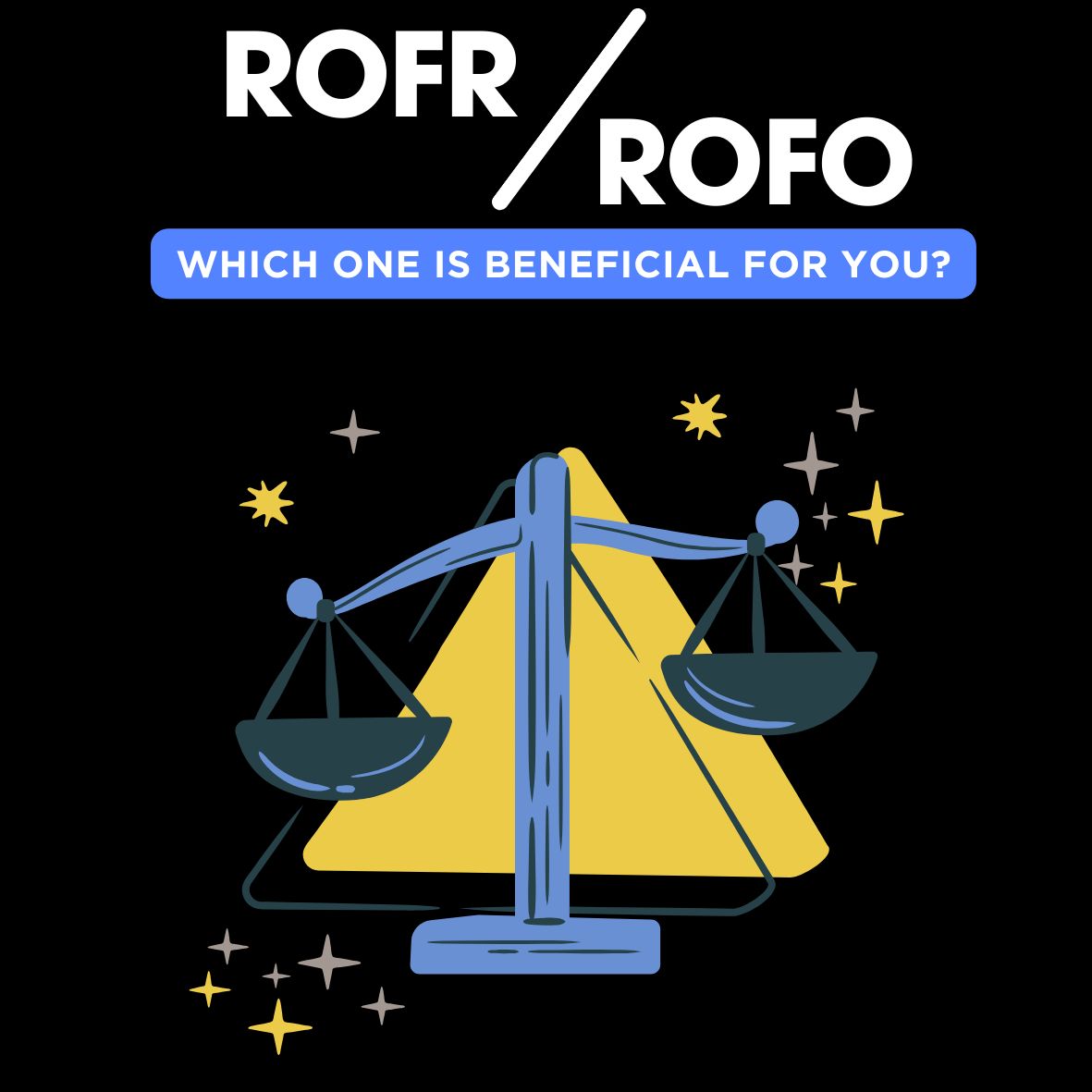Startup Learning Series: Understanding ROFR vs. ROFO
ROFR (Right of First Refusal)
➡️ What is ROFR?
The holder has the privilege to match any offer the seller receives before finalizing a deal with a third party. Essentially, they have the right to refuse an initial offer and step in with the same terms.
➡️ Example:
Startup A grants an investor a ROFR. If the startup receives a funding/ acquisition offer from Company X, the investor has the first shot at matching that offer before the startup can proceed with Company X.
ROFO (Right of First Offer)
➡️ What is ROFO?
Unlike ROFR, this gives the holder the first chance to make an offer before the seller approaches others. The seller is obligated to consider this initial offer before entertaining offers from third parties.
➡️ Example:
Startup B gives an investor a ROFO. If the startup decides to sell a portion of its shares, the investor gets the opportunity to present an offer first before the startup explores other options.
Which is more beneficial for Startups?
➡️ ROFO: This can be advantageous for startups aiming to maintain control and nurture strategic partnerships. It provides a structured process for selling shares and ensures that existing stakeholders are considered first.
➡️ ROFR: Startups looking for flexibility might prefer ROFR. It allows them to explore various offers and potentially secure a better deal.
Which is more beneficial for Investors?
➡️ ROFR: Investors seeking security and the ability to protect their investment may lean towards ROFR.
➡️ ROFO: Investors looking for proactive involvement and a first-mover advantage may find ROFO more appealing. It allows them to set the initial terms and potentially secure a deal before others come into play.
Considerations for both Parties
➡️ Negotiation Power: ROFO gives negotiating power to the holder by allowing them to set the initial terms.
➡️ Flexibility: ROFR provides flexibility for sellers to explore various offers before committing.
➡️ Relationship Dynamics: Both agreements impact the dynamics between startups and investors, requiring a careful understanding of the long-term vision and goals.
Conclusion
➡️ The choice between ROFR and ROFO depends on the specific needs and goals of the startup and the investor involved.
➡️ It's not a one-size-fits-all scenario, and understanding the nuances is crucial for creating mutually beneficial agreements.
Other posts in the Startup Learning Series:
🔗 Pre-emptive Rights: https://lnkd.in/dQKcThft
🔗 Liquidation Preference: https://lnkd.in/dRb2Eetc
🔗 Anti-dilution Clause: https://lnkd.in/dFSWs2xH
🔗 Understanding ROFR: https://lnkd.in/dxuVBxge
At STIR Advisors, we help startups and investors with our expertise to navigate through such intricacies.
ROFR (Right of First Refusal)
➡️ What is ROFR?
The holder has the privilege to match any offer the seller receives before finalizing a deal with a third party. Essentially, they have the right to refuse an initial offer and step in with the same terms.
➡️ Example:
Startup A grants an investor a ROFR. If the startup receives a funding/ acquisition offer from Company X, the investor has the first shot at matching that offer before the startup can proceed with Company X.
ROFO (Right of First Offer)
➡️ What is ROFO?
Unlike ROFR, this gives the holder the first chance to make an offer before the seller approaches others. The seller is obligated to consider this initial offer before entertaining offers from third parties.
➡️ Example:
Startup B gives an investor a ROFO. If the startup decides to sell a portion of its shares, the investor gets the opportunity to present an offer first before the startup explores other options.
Which is more beneficial for Startups?
➡️ ROFO: This can be advantageous for startups aiming to maintain control and nurture strategic partnerships. It provides a structured process for selling shares and ensures that existing stakeholders are considered first.
➡️ ROFR: Startups looking for flexibility might prefer ROFR. It allows them to explore various offers and potentially secure a better deal.
Which is more beneficial for Investors?
➡️ ROFR: Investors seeking security and the ability to protect their investment may lean towards ROFR.
➡️ ROFO: Investors looking for proactive involvement and a first-mover advantage may find ROFO more appealing. It allows them to set the initial terms and potentially secure a deal before others come into play.
Considerations for both Parties
➡️ Negotiation Power: ROFO gives negotiating power to the holder by allowing them to set the initial terms.
➡️ Flexibility: ROFR provides flexibility for sellers to explore various offers before committing.
➡️ Relationship Dynamics: Both agreements impact the dynamics between startups and investors, requiring a careful understanding of the long-term vision and goals.
Conclusion
➡️ The choice between ROFR and ROFO depends on the specific needs and goals of the startup and the investor involved.
➡️ It's not a one-size-fits-all scenario, and understanding the nuances is crucial for creating mutually beneficial agreements.
Other posts in the Startup Learning Series:
🔗 Pre-emptive Rights: https://lnkd.in/dQKcThft
🔗 Liquidation Preference: https://lnkd.in/dRb2Eetc
🔗 Anti-dilution Clause: https://lnkd.in/dFSWs2xH
🔗 Understanding ROFR: https://lnkd.in/dxuVBxge
At STIR Advisors, we help startups and investors with our expertise to navigate through such intricacies.


The eChai Effect - In Their Words
"For me, eChai is a second home. I've been associated with it since the early days, when it was already setting a different tone for how startup communities could work. As a traditional business owner entering the new-age D2C space, eChai supported me in every direction. Over the years, it became my window to the startup world — and also gave me lifelong friends who continue to show up, for business and beyond."
Pankaj Bhimani
Founder, 58miles
“eChai has been that turning point in my journey. It gave me a platform when I wasn’t looking for visibility but needed direction. Over the years, it became more than just a network. It became my tribe; a place where conversations sparked collaborations, and strangers became trusted sounding boards. What I value most is how effortlessly eChai brings people together - no airs, no filters, just genuine people with shared dreams. I owe a lot to this community and to Jatin, whose consistency and belief in people have shaped journeys like mine. Forever grateful to be part of something so real.”
Rushabh Shah
Managing Partner - STIR Advisors
"eChai isn’t just a startup community … it’s a mindset . eChai has been one of the most impactful communities in my entrepreneurial journey. It’s been a turning point . In a world where building something can often feel isolating, eChai gave me a sense of belonging. I’ve found mentors, collaborators, and friends here — people who genuinely want to see you succeed. It’s a space where ideas are challenged, actions are celebrated, and founders grow not just in scale, but in clarity and confidence. From late-night ideas to early-morning pitches, this community has quietly but powerfully shaped the way I build, think, and dream. I’ll always be grateful for the way eChai creates spaces where founders don’t just grow businesses — they grow together."
Koumal Kalantry
Founder, Bignano Ventures
eChai Partner Brands
eChai Ventures partners with select brands as their growth partner - working together to explore new ideas, open doors, and build momentum across the startup ecosystem.
